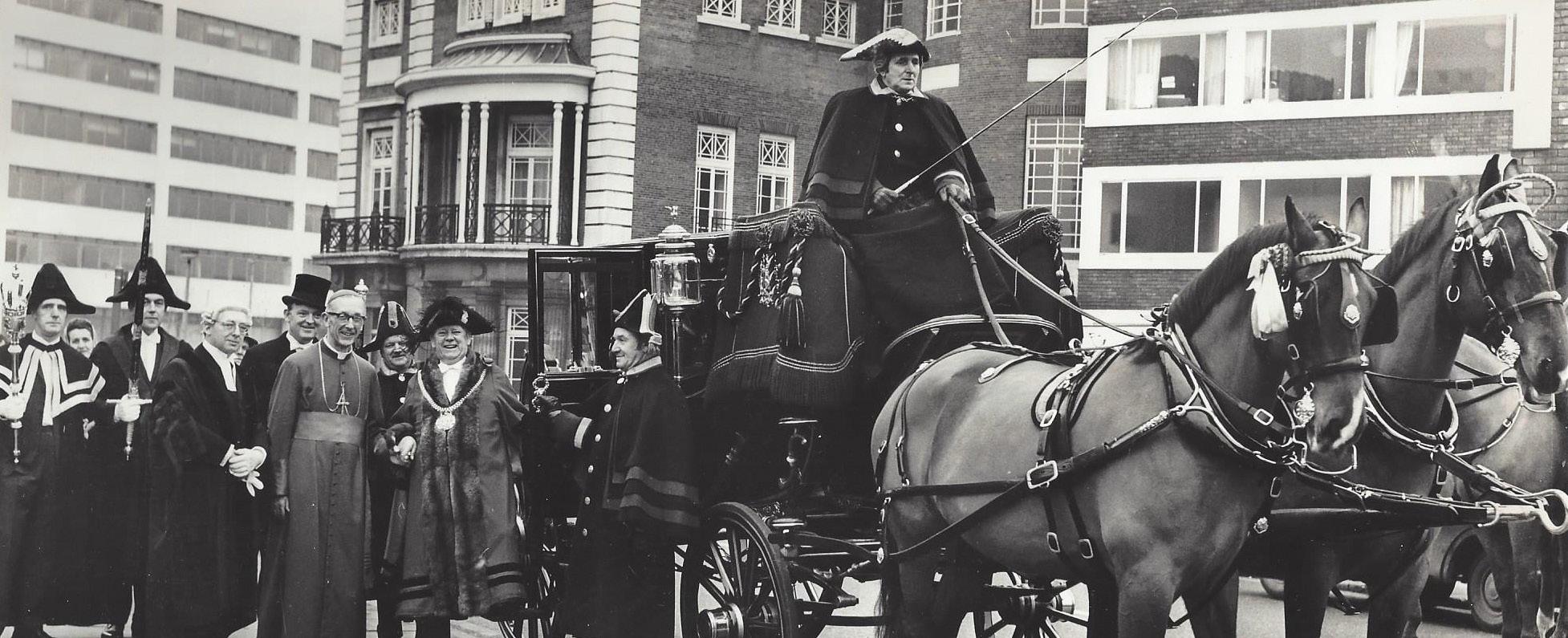
3 minute read
from the archives Good and peaceable citizens
by Neil Sayer, Archdiocesan Archivist
In spite of heavy rain, the band of St Edward’s Orphanage played outside the Pro Cathedral of St Nicholas. Ascending Copperas Hill from the Adelphi Hotel on a soggy December day in 1935, the procession passed by members of the Knights of St Columba and the Catholic Young Men’s Society to be met by a guard of honour of Girl Guides. The congregation, it was said, was the largest ever assembled for a Civic Sunday in a Catholic place of worship.
Advertisement
It was also the first time the Lord Mayor’s state visit was headed by a Catholic, though admittedly on this occasion Austin Harford was merely deputising for Robert Hall. It wasn’t until 1943 that Alderman Harford became Liverpool’s first Catholic Lord Mayor in his own right. Courteously, Mayor Hall in 1935 allowed him the use of the state coach as transport from the Town Hall, and the city’s officials in wigs and bicorn hats bore the civic regalia as Archbishop Downey occupied his throne for the ceremony. The procession included two Admirals, several members of Parliament, magistrates, consuls and representatives of the university, the Chamber of Commerce and other public bodies and religious organisations in the city of Liverpool.
We can’t promise the same degree of pageantry at the Metropolitan Cathedral this month, but the Civic Mass is still a treasured event, held there almost every year since the Cathedral opened in 1967. For reasons lost in the mists of time, it has moved from autumn to February or March, but it is still one of the Lord Mayor’s three official visits to receive the prayers and acclamation of the city’s Anglican, Catholic and Jewish communities for the Mayor’s year of office. In 1935 Archbishop Downey had offered prayers and promised the loyalty of the Catholic community to the Lord Mayor, and in 1977 Archbishop Worlock said in his first sermon to the Liverpool Civic Mass, ‘I gladly pledge myself and the community I represent to the service and renewal of the City of which we are so proud to be part.’ By the 1980s, though, there were subtle shifts in both the purpose of and attendance at the event. The pageantry was similar, with ceremonial robes and regalia and processions, and the presence of the Merseyside Police Band. But with the short- lived Merseyside County Council, the local civic leaders expanded in number. Today, those invited include representatives of the Merseyside Lieutenancy, members of the judiciary, the universities and the consular corps, as well as guests from local authorities across all the mainland areas of the archdiocese, and other distinguished citizens.
Not surprisingly, given the audience, Civic Mass sermons can venture into politics, as when Archbishop Worlock was advocating for urban regeneration in Liverpool, or they may be a plug for forthcoming events, as with the Papal visit in 1982. Much earlier, Archbishop Keating had given an address for the Mayor’s Sunday in 1922, shortly after the Russian revolution. Whilst there was then concern for the spread of communism and anarchy, he noted that ‘the vast majority are always good and peaceable citizens … when the fury of revolution has spent itself, social order and stable government resume’. Generally, though, the homilies offer a celebration of and thanksgiving for public service. In 1995 Archbishop Worlock said, ‘To all of you here today who give service to our City community and the County of Merseyside I offer sincere thanks. To your wives, or partners, or families whose self-sacrifice and shouldering of additional responsibilities enables those in office to play the role for which we honour them today, again my most sincere thanks.’ Archbishop Downey, when he praised Austin Harford as ‘he has always championed the cause of his fellow Catholics’, urged ‘that we shall strive to secure worthy legislators and competent rulers; and, sometimes, even that we ourselves shall not shrink from the burden of public office.’
Let us remember some of those who did not shrink: Austin Crowe, first Catholic mayor of Warrington in 1933, Simon Mahon and Nicholas Cullen, among many Catholic mayors of Bootle, and Novello Fairhurst, another pioneering Catholic as trade unionist, magistrate and mayor of Leigh in 1929. They were all part of what Archbishop Worlock characterised as ‘a community of mutual concern, justice and integrity.’
At the end of 2021, more than 274,000 people were recorded as homeless in England, including 126,000 children.










